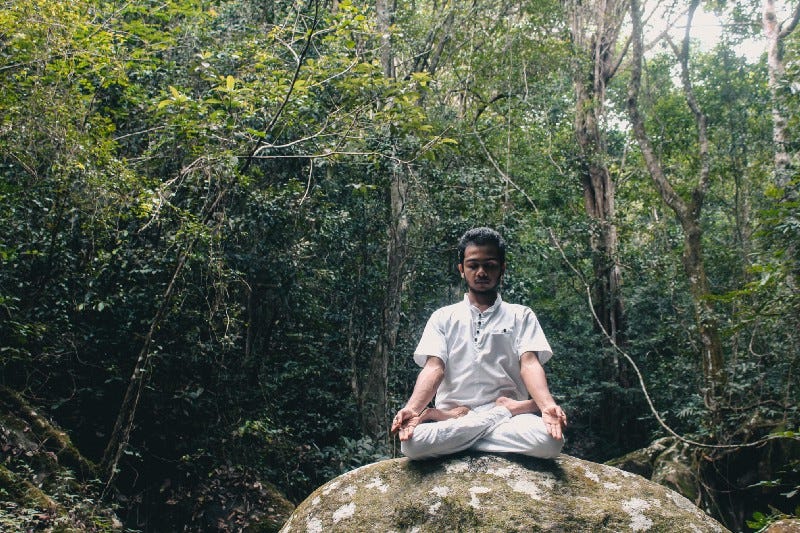
As the subtitle suggests, this is the second part of a broader essay about history’s most blissed-out generation. It can also be read alone if you like reading things alone.
Part 1, which focuses more on politics, is here.
‘So I like hippies because they stood for a lot of things I value — fun, creativity, peace, joy and good music. They were open to new ideas. Preferred “we’re all one” bridges to “lived experience” walls. Chose to focus on what they did like rather than what they didn’t.’
‘To a point. Some of them were thugs, opportunists and cult leaders.’
‘Sure, and a lot of them were lazy, and a lot more were hypocritical, and basically all of them were naïve. Who cares? What middle-class teenager isn’t a little lazy? What functional person isn’t a little hypocritical? And who gets up the courage to try something that’s never been tried before without being a little naïve?’
‘You like the general tone of the movement is what you’re saying.’
‘Right. People accuse hippies of being starry-eyed, but that sense of wonder and awe is one of the best things about them. Lines like ‘I’m going to camp out on the land / I’m going to try and get my soul free / We are stardust / We are golden / And we’ve got to get ourselves / Back to the garden’ may be slightly silly, but people who aim at something beyond themselves are always a little silly. You know what’s much more annoying than silliness? The noncommittal detachment that comes from a terror of making yourself look silly.’
‘Wabi DESTROYS Gen X apathy with POETRY and EMOTION.’
‘Sabi NEEDS to STOP INTERRUPTING.’
‘Sorry, go on.’
‘The thing is, since 2010 people may have rejected apathy in favour of all-out dedication to their favourite political causes, but they haven’t let go of the irony. The contempt. The barely suppressed rage. And of course, the “very online” way of communicating has only got worse as the Internet’s taken over more and more of our interactions: everyone’s copping the same boring above-it-all attitude, striking the same poses.’
‘There you go again, same old man yelling at a cloud.’
‘That’s exactly the attitude I’m talking about! I know I sound like a 90-year-old geezer complaining about youngsters and their phones, but I don’t care. I’m trying to say that I like the way hippies talked: “Are you experienced? Or have you ever been experienced? Well, I have…not necessarily stoned, but beautiful”. What a beautiful thing to say.’
‘I guess so — but where are you going with this?’

‘I’ve always said that the language you use to describe reality really, really matters. You could write a version of On the Road where all the same stuff happened but you changed the tone, and everything life-affirming about it would just come off tacky and unwholesome. Actually, someone did that and called it Fear and Loathing in Las Vegas.’
‘I thought you enjoyed that book.’
‘Doesn’t make it wholesome, does it?’
‘It isn’t the first thing I’d call it, no.’
‘Anyway, language is attitude, and attitude matters. There’s a certain way of phrasing a tweet that gets it shared on Cracked, and it’s got a lot to do with depressive resentment and very little to do with the awestruck gratitude of “Because the world is round / It turns me on”. Gratitude isn’t about capitulation to the powers that be. It’s a way of experiencing the world.’
‘What does turning on and dropping out do for the world though? “Free your mind”, the hippies said, as if that’s all you needed to do — as if you don’t have to change society’s structures as well. As if the decision to neglect hard political realities and get stoned in the park didn’t lead directly to the mess we’re in today. As if vague, feelgood language ever solved anything.’
‘First off, the hippies may not have changed the whole world with love, but they changed parts of it. They did leave a legacy. And second, they certainly changed their own experience of the world. Which isn’t nothing. Freeing your mind is important, and changing the world is also important, but you can’t do the second without the first. And the first is more important anyway.’
‘You don’t find ‘All you need is love’ a bit insulting to people who can’t make ends meet?’
‘The reason we want people to live long, peaceful, reasonably well-off lives is so they can fulfil themselves. Fulfilment’s the end. Justice is only the means. Jesus was all about feeding the hungry and even He said “Man shall not live on bread alone”.’
‘Well now that you’ve brought up religion — hippies were all about rehabilitating spirituality weren’t they?’
‘Another reason most people hate it and I love it. The love-and-peace doctrine, the mystical element, the scraps of Indian and Chinese philosophy, the theology of pleasure, the rockstar priesthood, the search for the original innocence of the Garden of Eden…of course they were never going to build a society out of all that syncretism, but they certainly built a hell of a community out of it for a while.’

‘Don’t forget the strong moral element.’
‘I was trying to forget it until you brought it up. The trouble is that today’s counterculture has kept the moral element and ditched everything else. People try and make religion about morality, but that’s confusing means and ends again…I’m telling you, fulfilment is the goal. Goodness is just another means to that end. Make personal holiness your ultimate goal and you’ve created a tyranny of conscience. Make society’s holiness your goal and you’ve created tyranny, full stop.’
‘That your way of saying you don’t like cancel culture?’
‘It goes way deeper than that. The left has always had a strong moral dimension, but every form of morality that’s ever existed has been more or less infected with the Puritan impulse, the ‘haunting fear that someone, somewhere, may be happy’. Christianity railed against that impulse until it became so infected with it itself that it gave it its name. The Puritan aspect of leftism isn’t just about calling people out when they mess up publicly, it’s about what all Puritanism is about: subordinating everything — every thought, instinct, word and deed, your own as well as everyone else’s — to a rigid notion of purity. It’s rooted in the fear of impurity, which is rooted in the fear of shame. And fear is the enemy of life.’
‘So you reckon we ditched the good times and kept the moralism?’
‘Basically, unless worrying about being a good ally is your idea of a good time. The way we analyse media today is unbearably moralistic: this is too tone-deaf to waste your time on, that is enjoyable but slightly problematic in places, the other is fantastic because it gets representation right. Art’s supposed to be imprecise and transgressive, or at least not cautious. And not only did hippies believe in the Dionysian freedom of art, they believed life itself should be an art: spontaneous, beautiful, eye-opening. Their radical politics was just a byproduct of their deeper belief in love, unity and transformation.’
‘And none of that lasted long. The trouble with hedonism is that it’s ephemeral.’

‘And the trouble with the moralism that replaces it is that there are never any good arguments against it. Doesn’t matter if it’s being advocated by a church, a straightlaced guru, a schoolmarm or a temperance movement. It’s designed to maintain order and decency and it does maintain order and decency, so if you resist it you’re a troublemaker. Troublemakers do damage and cause pain. There’s no way around it. We try being free for a while, we break a lot of eggs, we panic, we bring all the rules back…’
‘You’re a secret amoralist when it comes down to it, aren’t you?’
‘Well, I’m not sure. It’s certainly true that ’60s rock stars make terrible role models. Smashing up hotel rooms, brawling, wife-beating, getting wasted and dropping out of their commitments, using women for a night then writing contemptuous songs about them…’
‘Some people say that you can be a genius without doing all those things.’
‘Trouble is, I don’t agree with them. You can be highly gifted without acting like a jerk, sure, but there’s a difference between being highly gifted and being a star. I don’t think it was possible to be a rock ’n’ roll star in the ’60s without having a certain edge, a wildness, a desperation — sure, not every member of every band was like that, but didn’t all of the great ones have at least one?’
‘Maybe it’s better that we all treat each other properly and the music’s less good.’
‘Probably. But it’s a tradeoff. No use pretending that you can have social gentrification and “Purple Haze”.’
‘While we’re on music — ’
‘If you’re gonna start me off on music we’re gonna need a third post here.’
Which is here.




